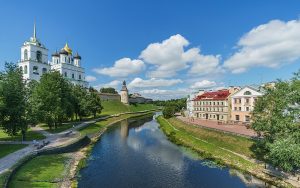
Pskov is a city (since 903) in the north-west of Russia. It is the administrative center of the Pskov region and a city of regional subordination. Located on the Great River at its confluence with the Pskov River, the city is one of the oldest cities in Russia. Until the beginning of the 18th century, Pskov was one of the largest cities in Russia and Europe, the most important defense and trade center of the country. The city is surrounded by five fortress rings (three of which have been preserved to this day), which made Pskov almost impenetrable.
The History of the Five Walls
The Pskov fortress is a defensive structure of Pskov, the core of which is Krom (Pskov Kremlin). The fortress arose, like most medieval border cities, with the foundation of the city – a fenced settlement. The founding date of the city and fortress is unknown. There is only the date of the first mention of the city – 903. The existence of the city in those days was confirmed in the Tale of Bygone Years, which reported under 903 that it brought Prince Igor’s wife, Olga from Pskov.
The first stone fortifications were erected in the middle of the 13th century. At the beginning of the 15th century, in connection with the development of artillery, the Pskov fortress was reinforced with towers. The Pskov fortress was one of the best Russian fortresses in the 16th century. A territory of 2.15 km was enclosed by five 9-km-long stone fortification belts, reinforced by 40 towers, 14 gates, wall, tower and underground passages.
Pskov, the Strong City with Rich Culture and History
Throughout its long history, Pskov more than once became the center of large-scale military operations, but was taken only once, not counting the occupation during both world wars. After the founding of St. Petersburg, Pskov lost its dominant position on the western borders of the country, and after the end of the Northern War, the borders moved far west and Riga and Revel (now Tallinn) moved to the Russian Empire, the value of Pskov as a trading and defensive point finally fell. During the Great Patriotic War, the city was occupied by Germany for three years, during which time 3,500 civilians were killed. In December 2009, Pskov was awarded the title “City of Military Glory”.
Pskov is an important tourist center of the Pskov region and the north-west of Russia. Monuments of ancient Pskov are included in the UNESCO World Heritage List. Trinity Cathedral, Pskov Fortress, Mirozhsky Monastery, Pogankinsky Chambers, a number of ancient churches of Pskov are included in the list of cultural heritage of the Russian Federation. The city is also a major transportation hub; it is located at the intersection of railways and major highways and a network of intercity buses is well-developed.
The Location
Pskov is located in the west of the European part of Russia, at the confluence of the river. The city is located in the center of the Pskov Lowland. The area of the city is 95.6 km². The length of the city from north to south is 9.2 km, and from west to east 10 km. The average height above sea level is 46.5 m.
Pskov is located on both banks of the Velikaya River, which is fed by the Pskov, Cheryokha, Mirozhok and Promezhitsa rivers in the city. Also in the city and its environs there are several small surface watercourses: the Milevka and Remontka rivers, the Kolokolnichy stream. The length of all Pskov watercourses is about 35 km. Twelve bridges were thrown across Velikaya and Pskov (including pedestrian and railway).
The Attractions in Pskov
A great variety of all kinds of wonderful monuments can be found in the city. If you choose the most interesting among them, then of course you can’t miss the Pskov Krom – the core of an ancient fortress, in which the Trinity Cathedral of the 17th century is the main architectural dominant of the city, attracting the eye even from remote points of the city.
Of the many monasteries in the city, only two integral ensembles have survived – Mirozhsky and Snetogorsky monasteries. But they are interesting, first of all, with their frescoes. The Transfiguration Cathedral of the Mirozhsky Monastery contains the only pre-Mongolian frescoes of the 12th century that are unique in the country, and the Cathedral of the Snetogorsky Monastery contains slightly later and worse preserved frescoes of the 14th century.
The Pskov fortress in ancient times was the only one in Russia in size, power and beauty and therefore deserves special attention. The fortifications are well preserved and include Krom, the walls of the Dovmont city and the last fortress wall encircling the Okolny city and the ancient part of Zapskovye.
Perhaps the most powerful impression of Pskov is its church architecture. There are not many cities in Russia where in a small area you can find more than two dozen stone churches that appeared no later than the 16th century. Remarkable in their simplicity and conciseness, one-headed Pskov churches with four-pitched or amazing eight-pitched roofs are distinguished by a well-thought-out asymmetry of the narthexes and aisles. Massive porches, separately standing or placed on the side wall of the belfry, belts in the upper part of the apse and drums – all these are signs by which one can easily recognize Pskov churches.
And finally, in Pskov, you can find many monuments of civil architecture, including several chambers of the XVII century, although not all of them are in satisfactory condition. The best among them are the Pogankins Chambers, where you can get acquainted with the internal structure of ancient buildings. The city has a fair amount of monuments of the 18th – 20th centuries. But only a very meticulous tourist who is ready to spend several days exploring the city will get to the point of studying them.
